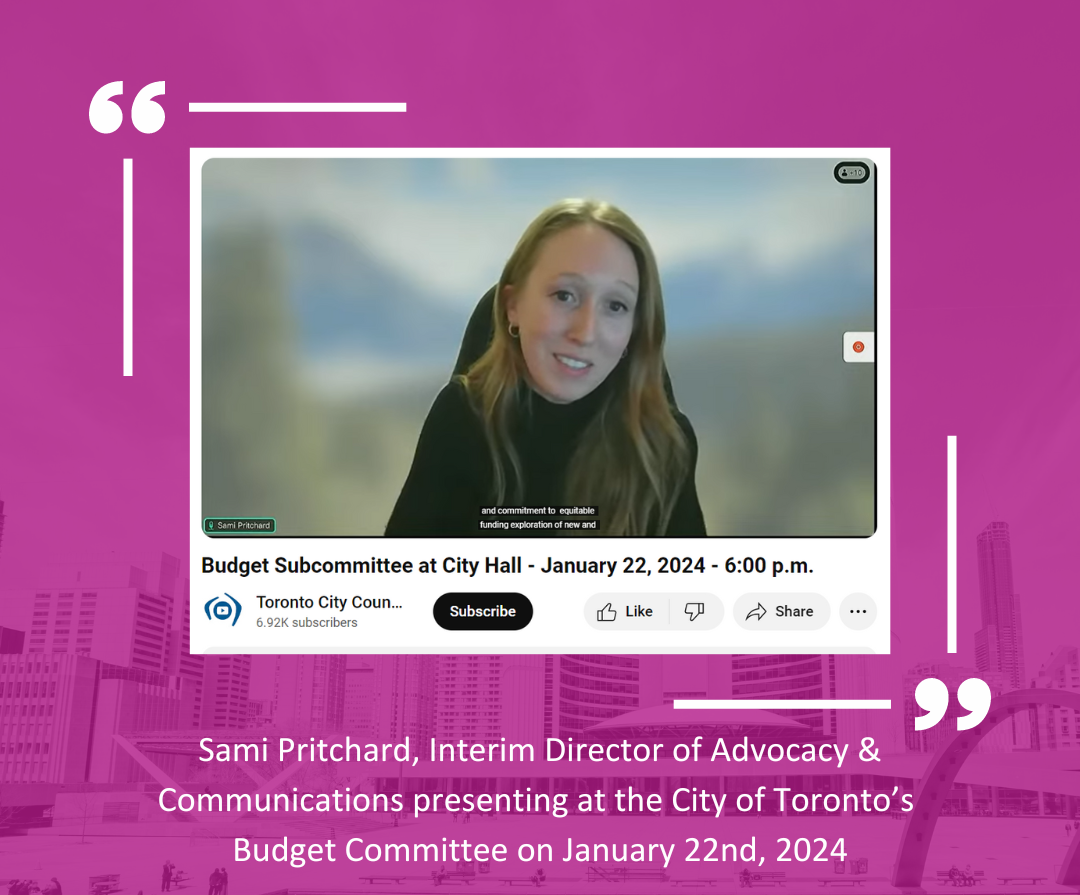
2024 City Budget Deputation
YWCA Toronto
Oral Presentation to the City of Toronto's Budget Committee
January 22, 2024
Good evening, my name is Sami Pritchard and I am the Interim Director of Advocacy and Communications at YWCA Toronto, the city’s largest multi-service organization serving women, girls, and gender diverse people.
From Scarborough to Etobicoke, the more than 13,000 people we serve across the city depend on our services to escape gender-based violence, access safe and affordable housing and emergency shelter, and secure employment. Many of our programs are funded by the City, a partnership that we are very grateful for.
The 2024 budget makes strides to address many impacts felt by the communities we serve. We are particularly glad to see the monumental contribution of new and enhanced funding from the City of Toronto and support the increase in property tax to fund essential services our city needs. However, we worry there has been an oversight of a gendered analysis throughout the budget process that directly impacts women, girls and gender diverse people in Toronto.
In July 2023, the City of Toronto passed a motion declaring intimate partner violence and gender-based violence an epidemic. We were thrilled to see the motion pass unanimously, and have been thankful for continued efforts on the matter, but we are deeply concerned about the lack of funding for the issues that an epidemic-level response demands. The funding and support for this issue matters, must be holistic and intersectional, and the city’s budget should reflect this priority. Further, within Budget 2024 we have not seen any additional funding allocated to the rollout of Toronto’s Gender Equity Strategy (GES). As an organization that partnered with the city for the development of the GES, this is highly concerning. A fully funded and supported GES has the potential to deliver transformational gender equity across Toronto.
As advocates for safe and affordable transit, we support the TTC fare freeze. However, service still remains a concern. While services may be increasing, more crowded transit during times outside of rush hour makes travel more challenging for those with mobility devices and parents with strollers and small children. Importantly, we urge funding for the Scarborough Busway, an integral transit line connecting Scarborough to the rest of the city including for those accessing our Employment Centre, Girls Centre and Teen Mothers Program – which the city funds – in Scarborough.
Recognizing the uptick in demand for shelter services in 2023, particularly to address meeting the needs of refugees and asylum seekers, we support the increased funding for shelter beds. However, we are deeply concerned about the framing of this issue being caused by refugees and asylum seekers alone.
Shelter services, including our two VAW shelters and two emergency shelters, have long been operating at maximum capacity with rigid funding structures. While the city funds our two emergency shelters, we do not receive enough funding to pay our shelter workers as much as city-operated shelter workers; in turn, we are losing our workers, leaving us in an ongoing staffing crisis. We encourage the investment of flexible and transparent funding for shelter services across the city.
As the city’s largest gendered housing provider, we also see firsthand the impacts of the lack of access to safe, affordable and accessible housing. We need greater investments in city-supported housing programs, such as the Rent Bank Program and Eviction Prevention in the Community program (or EPIC), to assist with the cost of living, support affordable housing, and prevent evictions amidst a housing crisis.
Regarding funding distribution, in the public consultations leading up to the budget, 43% of survey participants called for a decreased investment in policing services. Yet, the prepared budget reflects a $25 million increase in property tax-based funding for police services. This increased level of investment does not respond to communities' needs. We know that to meaningfully address the compounding issues facing our communities today, we need to see greater investment in mental health services, transit, affordable housing and other life-saving and stabilizing community supports, not a greater police presence.
One such funding increase needed is child care. Currently, the budget does not lay out enhancements or improvements to child care in the city. The 10-year capital plan only creates 1,600 new child care spaces—that is less than 10% of the city’s target of 18,200 as committed in the Canada-Wide Early Learning Child Care agreement. Drastic investment is needed to meet the essential service of child care in the city.
After years of austerity budgets, we applaud the steps council has taken to address the city’s strenuous financial situation and appreciate that the process has been transparent and intentional.
We will continue to advocate alongside you to see increased support from our provincial and federal governments to meet the city’s critical needs, and we need your support, dedication, and commitment to equitable funding, exploration of new and revised revenue tools and partnership to create a livable, thriving city.
We thank you for your time.
---
Sami Pritchard is the Interim Director of Advocacy and Communications at YWCA Toronto